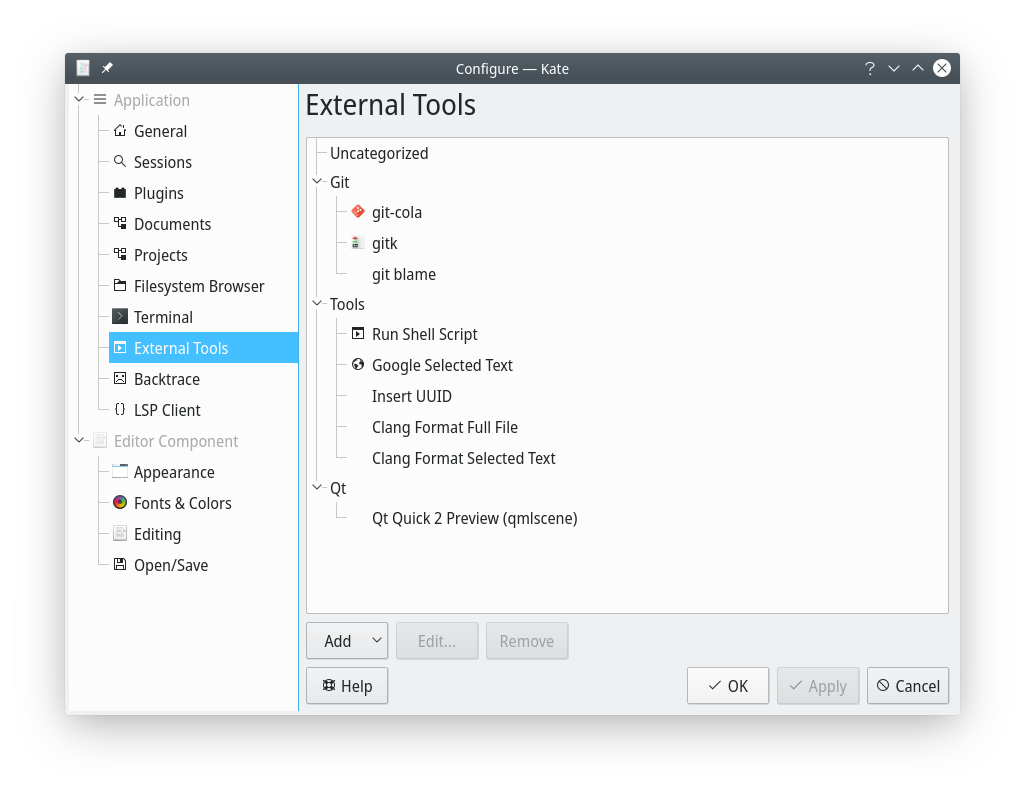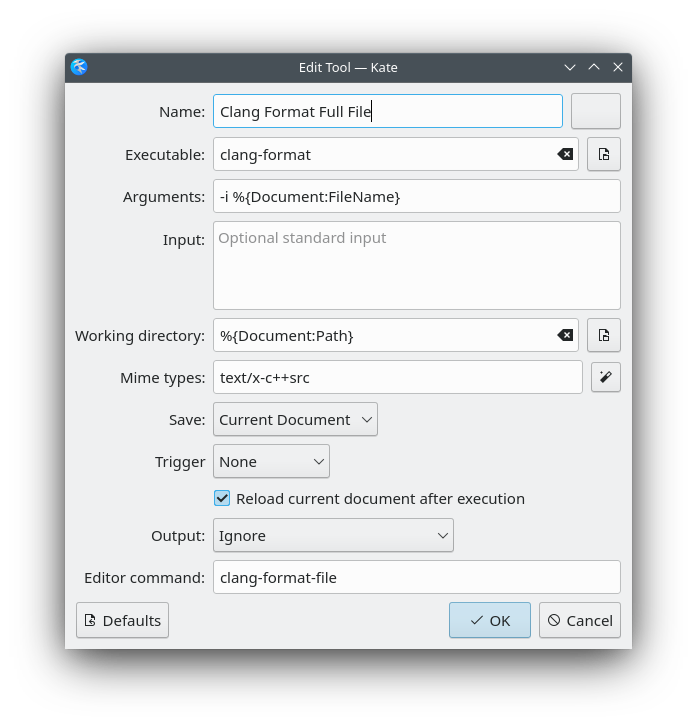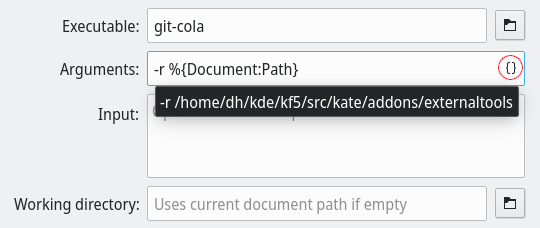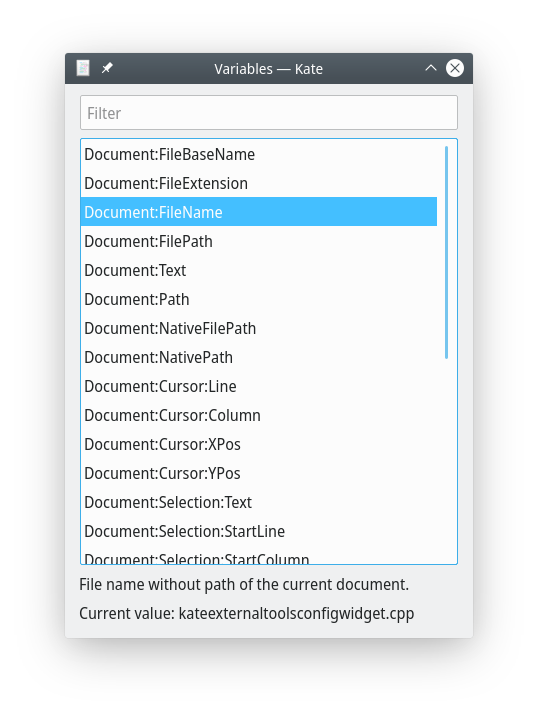The External Tools plugin allows to invoke external applications with data related to the current document, for example its URL, directory, text or selection. Once enabled, a config page appears as depicted below that allows to change or remove existing tools. Similarly, new tools can be added to your liking. The tools will then appear in the submenu of the menu of the application.

The config page allows to add new external tools by clicking on the Add button. In this case, a popup menu appears where one can either add a new external tool, add an existing tool from a predefined list, or add a new category to organize the external tools into categories. Similarly, the existing tools can be modified either by double-click or by invoking Edit..., and Remove removes the selected tools.
Editing a tool opens a config dialog that allows fine-grained configuration of the tool:

- As can be seen, many details can be defined, namely:
Name, the name of the tool, which will later appear in the menu.Icon, optional icon that is visible in the menu.Executable, executable including either a full path, or your executable must be in thePATHenvironment variable.Arguments, optional arguments that are passed to the executable.Input, optional input that is passed to the process via stdin.Working directory, the working directory the tool will be started in. If empty, the working directory is set to the current document’s path.Mime types, if set, the tool is active only if the current document’s mime type matches.Save, when invoked, saves none, the current document, or all documents.Trigger, a trigger to execute this tool. A trigger will only affect the currently active document and will only execute if the mimetype of current active document matches the mimetype of the external tool.- Following triggers are available:
None, this is the default, it means the tool has no trigger.Before Save, this trigger will execute right before saving the document.After Save, this trigger will execute the tool after the document was saved.
Reload current document after execution, useful when the current file is modified on disk.Output, the output defines the target of stdout. It is either set toIgnored,Insert at Cursor Position,Replace Selected Text,Replace Current Document,Append to Current Document,Insert in New Document,Copy to Clipboard, orDisplay in Pane.Editor command, optional command that can be used to invoke the external tool via the built-in command line.
The button Defaults is visible only for tools that are shipped with Kate. When clicked, all tool’s settings reverted to default (aka factory) values.
Some editing fields such as the Executable, the Arguments, the Input and the Working Directory support variables that are expanded on tool invocation. This is indicated by the icon {} that appears once one of these text input fields has focus (see red circle):

Hovering over one of these text input fields also shows a tooltip with the current expanded text. Further, clicking on the {} action will open a dialog that lists all available variables:

This feature provides a lot of flexibility when defining an external tool since
all variables of the form %{...} are expanded when the tool
gets invoked. There are two kind of variables supported:
%{variable-name}%{variable-name:<value>}
The first form %{variable-name} simply replaces the
variable with its contents. For instance, the variable %{Document:FileName}
is replaced by the current document’s filename without its path.
The second form %{variable-name:<value>} gets the
<value> as contents. For example, this can be used
to expand an environment variable with %{ENV:HOME},
or one can obtain the current date in the preferred format like
%{Date:yyyy-MM-dd}.
- Supported variables include:
Document:FileBaseName: File base name without path and suffix of the current document.Document:FileExtension: File extension of the current document.Document:FileName: File name without path of the current document.Document:FilePath: Full path of the current document including the file nameDocument:Text: Contents of the current document.Document:Path: Full path of the current document excluding the file name.Document:NativeFilePath: Full document path including file name, with native path separator (backslash on Windows).Document:NativePath: Full document path excluding file name, with native path separator (backslash on Windows).Document:Cursor:Line: Line number of the text cursor position in current document (starts with 0).Document:Cursor:Column: Column number of the text cursor position in current document (starts with 0).Document:Cursor:XPos: X component in global screen coordinates of the cursor position.Document:Cursor:YPos: Y component in global screen coordinates of the cursor position.Document:Selection:Text: Text selection of the current document.Document:Selection:StartLine: Start line of selected text of the current document.Document:Selection:StartColumn: Start column of selected text of the current document.Document:Selection:EndLine: End line of selected text of the current document.Document:Selection:EndColumn: End column of selected text of the current document.Document:RowCount: Number of rows of the current document.Document:Variable:<variable>: Expand arbitrary document variables.Date:Locale: The current date in current locale format.Date:ISO: The current date (ISO).Date:<value>: The current date (QDate formatstring).Time:Locale: The current time in current locale format.Time:ISO: The current time (ISO).Time:<value>: The current time (QTime formatstring).ENV:<value>: Access to environment variables.JS:<expression>: Evaluate simple JavaScript statements.PercentEncoded:<text>: Percent encoded text.UUID: Generate a new UUID.
Several tools are shipped by default. However, if you have more useful tools
please contribute those to (kwrite-devel kde.org) so that we can add them to this list.
All default tools are visible in the list view by default. However, all tools can be
changed to your liking, including the category or even deleting tools.
Deleted tools can be added back again by clicking on the
button in the config page as described above.
git-cola
- git-cola is a graphical git client that enables you to easily stage and commit changes.
If installed, it is available also through the command line by typing
git-cola Name: git-colaIcon: git-colaExecutable: git-colaArguments: -r %{Document:Path}Editor command: git-cola
gitk
- gitk is a git client as well that allows to nicely visualize the git history.
Name: gitkIcon: git-guiExecutable: gitkWorking directory: %{Document:Path}Editor command: gitk
git blame
- Starts git blame to easily follow git changes in the current file.
Name: git blameExecutable: gitArguments: gui blame %{Document:FileName}Save: Current DocumentWorking directory: %{Document:Path}Editor command: git-blame
Run Shell Script
- Starts an external konsole in which the current document is executed.
The script needs to state the interpreter in the first line via a shebang
#!/path/interpreter. Name: Run Shell ScriptIcon: system-runExecutable: konsoleArguments: -e sh -c "cd %{Document:Path} && pwd && chmod -vc a+x %{Document:FileName} && ./%{Document:FileName} ; echo Press any key to continue. && read -n 1"Save: Current DocumentWorking directory: %{Document:Path}Editor command: run-script
Google Selected Text
- Search in google for the selected text.
Name: Google Selected TextIcon: globeExecutable: xdg-openArguments: "https://www.google.com/search?q=%{Document:Selection:Text}"Editor command: google
Insert UUID
- Inserts a new UUID each time this action is invoked.
Name: Insert UUIDExecutable: echoArguments: %{UUID}Output: Insert at Cursor PositionEditor command: uuid
Clang Format Full File
- Runs clang-format on the current file on disk. The document is reloaded afterwards.
Name: Clang Format Full FileExecutable: clang-formatArguments: -i %{Document:FileName}Working directory: %{Document:Path}Save: Current DocumentReload: YesEditor command: clang-format-file
Clang Format Selected Text
- Runs clang-format just on the selected text in the current document.
Name: Clang Format Selected TextExecutable: clang-formatArguments: -assume-fileName: %{Document:FileName}Working directory: %{Document:Path}Input: %{Document:Selection:Text}Output: Replace Selected TextEditor command: clang-format-selection
Qt Quick 2 Preview (qmlscene)
- Previews the current qml file in qmlscene.
Name: Qt Quick 2 Preview (qmlscene)Executable: qmlsceneArguments: %{Document:FileName}Save: Current DocumentWorking directory: %{Document:Path}Editor command: qml-preview
JSON Format Full File
- Format the entire JSON file.
Name: JSON Format Full FileIcon: application-jsonExecutable: jqArguments: %{Document:FileName}Save: Current DocumentWorking directory: %{Document:Path}Output: Replace Current DocumentEditor command: json-format-file
XML Format Full File
- Format the entire XML file.
Name: JSON Format Full FileIcon: application-xmlExecutable: xmllintArguments: --format %{Document:FileName}Save: Current DocumentWorking directory: %{Document:Path}Output: Replace Current DocumentEditor command: xml-format-file